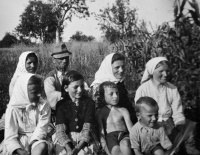The cooperative paid 13,000 crowns for cows and pigs

Download image
Terezie Snopková, née Omelková, was born in Babice on 14 November 1929. She had five siblings, all of whom helped on the family farm. Her father was a small farmer and as a good musician, he earned extra money playing the organ in church and at funerals, especially during the Protectorate, while her mother took care of the household. The large family did not suffer even in wartime. They supplemented their livelihood by raising geese. Following primary school, Terezie attended the family school in Napajedla. She joined Orel, a catholic culture and sports organisation after the war. In 1947 she took part in a youth congress in Prague. She met her future husband Josef Snopek from nearby Kudlovice at a shared Orel and Sokol event. They married in 1952. A farming coop was founded in Kudlovice the same year. Snopek’s family was persuaded to join but withdrew after six months due to incompetent management and poor results. In revenge, the coop management allocated them subpar land far away from the village, which the family took care of until 1963. This is when their private farm was finally destroyed. The Snopeks received 13,000 crowns for cows and pigs, but were allowed to keep the family vineyard. The coop took over their apricot orchard and felled it, and they were forbidden access to the plum orchard. The cooperative offered Josef Snopek a job as an agronomist but he refused because of previous injustices. The local party organization then retaliated against the Snopeks by issuing negative personal testimonials, so he had a hard time finding jobs. Their children were prevented from pursuing higher education. Josef Snopek found a job after a long time in the sugar mill in Hulín where his wife Terezie found a job too. She eventually worked at the sugar mill until retirement. Due to a poor rating from the village, her daughter Marie only got to the secondary school of education on her third attempt, and was prevented from university studies. She only completed her bachelor’s degree remotely after 1989. Son Josef faced similar difficulties, eventually graduating from university. No one in the Snopka family returned to private farming after the fall of the communist regime.












